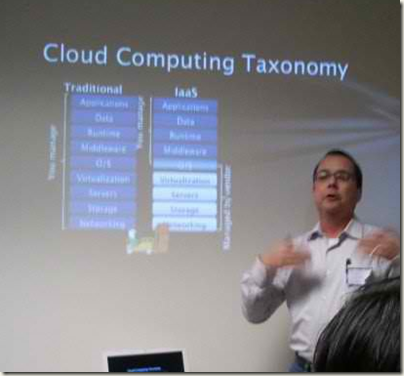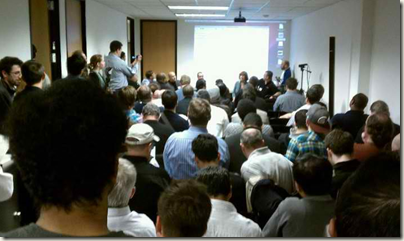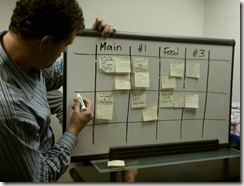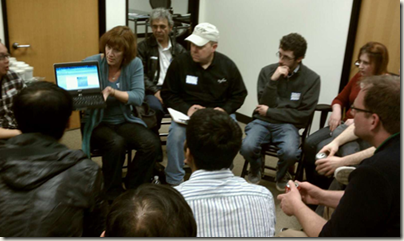Trip Report: CloudCampLA
Last night I attended and spoke at the second (annual?) CloudCampLA unConference in Manhattan Beach, CA.
What are CloudCamps?
Dave Nielsen, from San Jose, CA leads a group which organizes and hosts CloudCamp unConferences world-wide. They are intended to bring early adopters and interested parties together for discussions and brief demos of cloud technologies.
Dave’s team hosted over 90 events world-wide in the first year (last year). Events run either in the evening or on a weekend day. Some portions of the event have been live streamed as well.
How does it work?
CloudCamp is currently an unConference, sort of like a BarCamp. What this means is that the specific agenda, speakers, topics, etc…is created at the beginning of the event by the people attending.
There are a couple of ‘parts’ to the agenda. The first is 5 minute talks by the main sponsors. These are called Lightning Talks.
Lightning Talks
Here’s Azure ISV evangelist Brian Loesgan on PaaS. 5 minute talks are tricky to pull off. I think the most effective include one short product demo and one main message. It’s really hard to distill cloud offerings into one message, but that’s what works best in this format.
The other sponsors showed their product offerings. Most of those seemed to be ‘add-ons’ for IaaS vendors, i.e. configure your VMs via script or a GUI, create a type of app quickly using another vendors IaaS implementation (in this case it was a telephony application).
unPanel
The next section consists of audience-generated questions and a volunteer (unPanel) of 1-2 minutes answers. Of course, I had to step up to answer Question #2 from the audience ‘How do you scale a relational database in the cloud?’
In my answer I talked about the big 3 in the relational database as a service area – SQL Azure, Amazon RDS and Database.com. There seemed to be a good amount of interest in this topics, so…
Sessions
In the next section of the conference, attendees propose session topics and then vote on which sessions they are going to attend. Above is the session board. My 5 minute talk led to a session proposal ‘About Cloud-based RDMS systems’ which I was asked to lead.
There were two rounds of sessions, sessions being around 40 minutes each. Session topics ran the gamut – from ‘How do you test cloud-based systems?’ to ‘How do you geo-locate streaming media cloud applications?’
Who attends?
We had a packed house of over 200 interested community members. About 50% seemed to be already working in / testing cloud implementations – most of these were on AWS. Most of the crowd were developers. There were more non Microsoft developers, i.e. Java, PHP, Ruby, etc… than .NET.
Interestingly, there seemed to be no one from Amazon (AWS) at CloudCampLA. There were a couple of people from SalesForce.com, but they didn’t speak at any sessions.
In a kind of humorous moment, I was introduced to the LA Linux UG lead who cut our conversation a bit short when he found out where I worked. <smile>
There were also recruiters, including Stacey Broadwell from ITTalentSearch. Thanks to Stacey for the photos that I am using in this blog post.
What are attendees talking about?
Typical cloud topics, such as which vendors offering to use, how to deploy, manage, secure, etc… emerged.
An interesting trend I noted was the inclusion of tooling for the cloud. The main sponsor – MorphLabs provides a GUI to administer the IaaS services for Amazon, Rackspace, etc…Another speaker created a powerful command-line set of tools to script deployment across cloud vendors.
There was a great deal of detailed discussion about Amazon’s AWS offering. Lots of sharing between attendees who were already using AWS and those who were interested in the details on using AWS – particularly VMs on EC2.
What did I talk about?
I was happy to lead an overflow session which turned out to be a deep dive on RDMS systems in the cloud. After explaining the storage offering types at a high level, i.e. relational vs. non-relational, I then answered questions about SQL Azure.
Because there were no projectors I had to improvise my demos. I started by talking about tooling supporting, showing first the Silverlight portal. The crowd seemed really interested and asked lots of great questions.
I then moved into the areas of high availability (geo-colocation – included in SQL Azure, you pay more in Amazon RDS) and then on to very specific questions about T-SQL and feature compatibility between on premises SQL Server and SQL Azure.
Next we had a good discussion about Amazon RDS MySQL features in comparison to SQL Azure features (current and CTP). There was a great deal of interest about our announced Federation and SQL Azure Reporting CTPs.
It was also interesting to hear from a customer on the Azure platform. His company has been using Azure storage (tables, blobs and queues) since release and is now planning to add SQL Azure to it’s solution. Other attendees were quite interested to hear what his experience with our platform was. This also led to a discussion of actual cost and how he monitored / planned for / worked with product cost.
All-in-all I really enjoyed listening and speaking at CloudCampLA and I am looking forward to supporting and participating in future Cloud Camps.
What’s next for CloudCamp?
First off, there will be more instances of CloudCamp. The next one in SoCal will be held in San Diego on Feb 9 – register here.
Dave’s been thinking about adding another format to CloudCamp – one that is more like the CodeCamp model. His idea is to get community speakers and vendor speakers and to have a pre-published agenda with more technical (less conceptual) content and, in particular, more demos. To that end, he plans to have projectors in each session room and to set sessions for around 60 minutes each.
If you have the opportunity, I would recommend attending a CloudCamp unConference near you - or better still, organizing one of your own.




